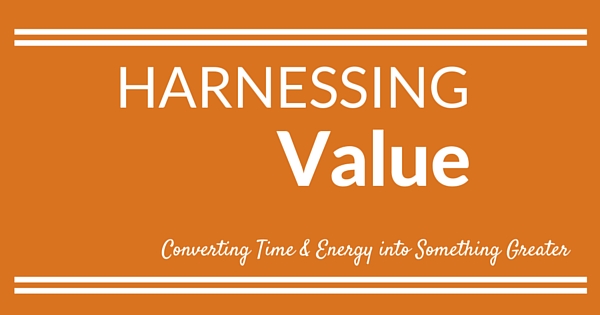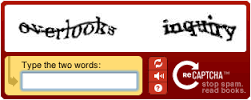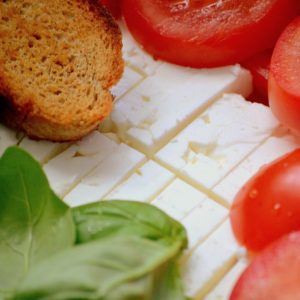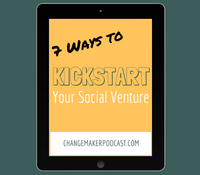Get more good stuff.

When filling out an online form, we’ve all encountered a CAPTCHA:
 You know, the blurry, squiggly words confirming that you’re a human and not a bot. Although somewhat annoying, their purpose is to stop spam and prevent computer programs from making bulk transactions (e.g. purchasing thousands of concert tickets so they can be later sold at outrageous prices).
You know, the blurry, squiggly words confirming that you’re a human and not a bot. Although somewhat annoying, their purpose is to stop spam and prevent computer programs from making bulk transactions (e.g. purchasing thousands of concert tickets so they can be later sold at outrageous prices).
It’s apparent that this technology was created to provide website security. But did you know that each time you solve a CAPTCHA you are also solving important problems; like digitizing tens of thousands of old articles and books?
Great innovators continuously look for new ways to do things better. The following stories highlight how to harness the time and energy spent in one area and apply it to do something valuable in another.
reCAPTCHA – Making 10 Seconds Do More
While working with a team at Carnegie Mellon University, Luis von Ahn helped to create CAPTCHA security for online forms. This valuable technology was quickly adopted (eventually bought out by Google) and as of 2011, approximately 200 million CAPTCHAs were typed each day. (Luis von Ahn TED 2011)
While proud of his success, von Ahn saw a huge opportunity. Two-hundred million tasks at about 10 seconds each equated to 500,000 hours spent daily typing CAPTCHAs.
By seeing this massive amount of brainpower available in 10 second chunks, von Ahn reinvented CAPTCHA to serve a greater purpose. Now called reCAPTCHA, the words that you verify are no longer arbitrary. They come from old books and tattered articles, which are part of libraries looking to digitize them. Computer scanners cannot decode these words; it’s something that only humans can do.
Your entries are used to transcribe text so old information can be made available to new readers. reCAPTCHA has completed digitizing the archives of The New York Times since the year 1851 and thousands of books from Google Books. (Wikipedia)
“The number of sites that are using reCAPTCHA is so high that the number of words that we’re digitizing per day is really, really large. It’s about 100 million a day, which is the equivalent of about two and a half million books a year. And this is all being done one word at a time by just people typing CAPTCHAs on the Internet.” – Luis von Ahn (TED 2011)
Artis Renew – Powering Gyms with People
You go to a gym for fitness and health, using the equipment to push your body and get results. Your sweat, your energy are poured into your workout.
Now, all of the energy that you output can serve as a valuable input. Bikes, cross trainers, and cardio machines at dozens of health clubs around the world are converting “sweat-energy” into electricity.
Italian company Technogym created the Artis Renew line of equipment to harvest the kinetic energy produced from exercising and send it directly back to the grid in the gym. The equipment will power up once the user starts to exercise – generating electricity from the energy they are producing. Any excess energy is sent to the building’s electrical supply so it can be used in other ways.
Gyms are seeing great results:
The Club and Spa at Cadbury House in the UK was the first health club in the world to install the equipment. They rely on about 100 watts of energy each hour coming from each piece of equipment. (Daily Mail)
In March, The Edge fitness complex at Leeds University congratulated its members for generating a cumulative 574KWH of power, enough to power a plasma TV for 158 days, light a room for 9,573 hours and keep a fridge running for nearly two whole years. (The Guardian)
Barilla & Foodbank NSW – Cooking Classes to Serve
Working with a team, learning new recipes, and enjoying delicious food are all part of a good cooking class. Aspiring home chefs can find classes in most places throughout the world.
On its own, a cooking class is something that people gladly spend time and money on. But when paired with an innovative idea, learning to cook can be transformed into something greater.
In Australia, pasta-maker Barilla and the Foodbank NSW/ACT (Australia’s largest food relief charity) are serving up a unique cooking experience. Organizations can book team-building events at the Barilla-Foodbank Cooking School and learn how to make savory Italian food recipes while serving those in need.
As students learn to cook during these paid classes, they prepare additional portions that are packaged and delivered to disadvantaged families. The impact spreads even further as proceeds from the classes are used to fund an educational masterclass for 40 less-privileged members of the community.
Duolingo – Translating the Web with Free Education
reCAPTCHA founder, Luis von Ahn has continued to focus his efforts on solving huge problems.
“I would like to translate all of the Web, or at least most of the Web, into every major language.” (TED 2011)
Computers have limited translation accuracy and large-scale human translations involve a hefty price tag. von Ahn wondered if there was another way to achieve this goal.
Enter Duolingo.
This app was created to help people learn a new language for free while simultaneously translating the web. With over 12.5 million users, von Ahn shared research that spending 34 hours on Duolingo teaches the equivalent of one semester of a college language course (Business Insider).
Beginners start with simple sentences to translate. As they become more advanced users, the sentences get more complex and ultimately their translations contribute to websites such as CNN and Buzzfeed.
Understanding the value of education for everyone, von Ahn pledged to keep Duolingo free to use. Therefore, the revenue comes from companies in need of translation services.
With Duolingo, people are able to have fun, learn a new language, and translate the web so it can be available for all to learn from.
Value from Value
All of these stories involve looking at the same thing in a different way. Value can be found in many places and as we’ve seen, it can even extend from something that’s already considered valuable.
In an interview with Business Insider, Luis von Ahn shares his thoughts on this innovative approach in a succinct way:
“It’s just taking something that people do anyways and trying to extract value out of it.”
